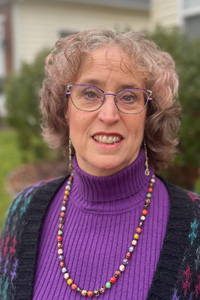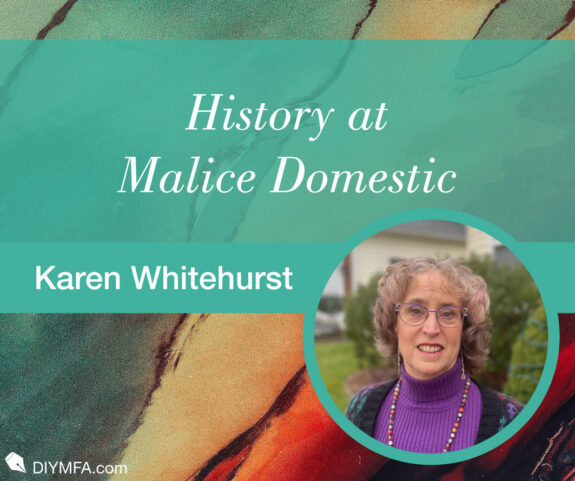As writers, we are encouraged to go to conferences. To get the lay of the genre and the industry. To fangirl/boy with our favorite authors. To network and to take workshops. To meet and pitch to agents. In short, to find our community.
I cannot think of a better one for the new or emerging writer (a term I dislike, but one with a certain utility) than Malice Domestic (www.malicedomestic.org). This is the annual convention/conference for readers and writers of traditional mysteries. Agatha Christie is the patron saint here, so no explicit sex, violence, or gore. The context and the consequences of the violence, usually murder, drive the stories here: so, no to James Ellroy and Karin Slaughter, and yes to Martin Edwards, Catriona McPherson, and Misty Simon.
As a convention, it’s fun and low-key. One author described Malice to me as a great, annual family reunion. I go to Malice to hang out with my friends. I go to find new authors and books tho’ I am the hardest sell because I am so eclectic (read mercurial) in my tastes. Also, my reading tastes lean toward the grittier police procedural, which can cross over the line to hard-boiled and noir, more Bouchercon and ThrillerFest. (I’ll discuss them at a later date.) I go to learn new things.
Malice is so worth it—especially the author interviews. This year, it was Ann Cleeves, Vaseem Khan, and Hank Phillippi Ryan. Abir Mukherjee was supposed to be here, but he got quarantined in Britain due to Covid. (Did you think we’d heard the last of the virus?) However, with a little technical help from Zoom, Mukherjee joined Khan for their live-from-Malice podcast of the Red Hot Chili Writers, #99—Britain v America: the Indian Tea Party. (https://www.spreaker.com/show/red-hot-chilli-writers ). Once the tech started working—all hail the Marriot staff!—it was hilarious. No Malice is complete without a presentation by Lucy Zahray, aka the Poison Lady, who will teach you how to poison your victims accurately.
Don’t try using strychnine in Britain before 1819.
This year seven or eight panels dealt with some historical topic. Historical mystery (hist-myst) generally falls in the traditional mystery category. I only went to four of these panels. After all, we can’t do everything at a con, no matter how much we want to do so; the spirit is willing, but the flesh is weak. Sometimes, the programmers have to set panels against each other in a time slot. Annoying, but it happens. Still, there’ll be at least one we’ll regret not going to. This year, I couldn’t make the one on the tension between historical fact and historical imagination (set against another historical panel) and one on thrillers wherein the past haunts the present (needed to eat—yeah, don’t forget to do that).
The panels I did make were quite good, so no need for teeth-gnashing. Most of the discussion involved authors discussing who their protagonists are, how and when they do research, and that very real tension between fact and imagination.
Many of the authors created protagonists from the lower ranks of society, as one author put it, someone without authority or someone who is a social upstart. I can’t say my own protagonist is a social upstart, merely an outsider amongst the aristocracy. The outsider is another way to do it, and there were a few of those, like “the agony aunt.” (Agony in Victorian understanding means a problem, and such columns were published in the newspapers from the late 18th century. Lonely hearts letters, too.)
As to research, most do it before and during the writing process: one described going down the research hole for three months before writing, while another regarded research as nourishment during the writing. Yet, another described doing research after the first draft as “cleaning up after a party.” Overall, the authors did it throughout the process.
Take away: do what works for you, but without going down the research rabbit hole.
One of the moderators said historical novels are a good way to educate about history, particularly social history. Up to a point, I agree. In fiction, we’ve got to tell a good story with good, relatable characters. If there’s truth to be found here, it’s emotional truth. Those two objectives mean that sometimes accuracy’s going by the boards. Now, there will be times when we’ve got to make it up because there’s no documentation or there’s no way anybody could’ve had that experience, such as treating smallpox with red flannel or driving a Roman chariot.
Best question to the panelists in any session—What did you learn the hard way? The lessons gleaned—
- Don’t think it’s going to be too easy. It’s a long process (writing a historical novel).
- No guarantees on getting published. Do it because you love it. Have fun and entertain yourself, and then others. (Sound advice for any type of writing.)
- Don’t be too angry with the copy editor.
- It’s important the writer knows the historical details, but it’s not necessary that the readers know them.
And that wraps up the report from the 35th Annual Malice Domestic. Hope to see you there next year, along with Guest of Honor Sujata Massey, Lifetime Achievement Award winner Elaine Viets, and the toastmaster, Lori Rader-Day.

A former college professor, Karen Whitehurst holds a Ph.D. in British history from the University of Virginia. She currently resides in Maryland with one long-suffering husband, three naughty cats, and over one hundred houseplants. A writer of both historical mystery and SF & F, she is currently at work on a mystery set in 18th century England during the Gordon Riots.
For more information, visit her website.







